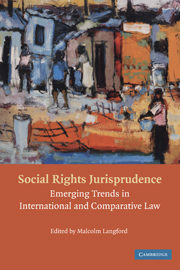Book contents
- Frontmatter
- Contents
- Foreword – Philip Alston
- Preface
- PART ONE OVERVIEW
- PART TWO SELECT NATIONAL JURISDICTIONS
- PART THREE REGIONAL PROCEDURES AND JURISPRUDENCE
- 17 African Regional Human Rights System
- 18 The Inter-American Commission on Human Rights
- 19 The Inter-American Court of Human Rights
- 20 European Court of Human Rights
- 21 The European Committee of Social Rights
- 22 European Court of Justice
- PART FOUR INTERNATIONAL HUMAN RIGHTS PROCEDURES AND JURISPRUDENCE
- PART FIVE SPECIAL TOPICS
- Notes on Contributors
- Table of Authorities
- Index
- References
18 - The Inter-American Commission on Human Rights
Defending Social Rights Through Case-Based Petitions
Published online by Cambridge University Press: 05 June 2012
- Frontmatter
- Contents
- Foreword – Philip Alston
- Preface
- PART ONE OVERVIEW
- PART TWO SELECT NATIONAL JURISDICTIONS
- PART THREE REGIONAL PROCEDURES AND JURISPRUDENCE
- 17 African Regional Human Rights System
- 18 The Inter-American Commission on Human Rights
- 19 The Inter-American Court of Human Rights
- 20 European Court of Human Rights
- 21 The European Committee of Social Rights
- 22 European Court of Justice
- PART FOUR INTERNATIONAL HUMAN RIGHTS PROCEDURES AND JURISPRUDENCE
- PART FIVE SPECIAL TOPICS
- Notes on Contributors
- Table of Authorities
- Index
- References
Summary
INTRODUCTION AND BACKGROUND
The Inter-American Commission on Human Rights (‘Commission’) is the ‘engine’ of the inter-American human rights system. It is the first responder and, in most cases, final arbiter of the thousands of human rights complaints brought to the system's attention each year. Created in 1959, the Commission is an autonomous organ of the Organization of American States (‘OAS’), mandated ‘to promote the observance and defense of human rights’ in all OAS Member States. It has been headquartered in Washington, D.C., since 1960, where it meets in ordinary and special sessions several times a year. A ‘principal organ’ of the OAS since 1970, the Commission has both contentious and promotional functions, which, in contrast to the more limited jurisdiction of its sister organ, the Inter-American Court of Human Rights (see following Chapter in this volume), it is competent to exercise over all thirty-five OAS Member States.
The Commission is composed of seven members of ‘high moral character and recognised competence in the field of human rights’, who serve in a personal capacity, on a part-time basis, for terms of four years and who may be re-elected once. They are supported by a full-time Secretariat, responsible for the receipt and processing of all petitions, correspondence and communications, as well as the preparation of draft reports, resolutions, studies and any other work entrusted to it by the Commission.
The Commission's extensive case-based jurisprudence, as developed under its rule-bound contentious jurisdiction, is the subject of this chapter.
- Type
- Chapter
- Information
- Social Rights JurisprudenceEmerging Trends in International and Comparative Law, pp. 339 - 371Publisher: Cambridge University PressPrint publication year: 2009
References
- 1
- Cited by



